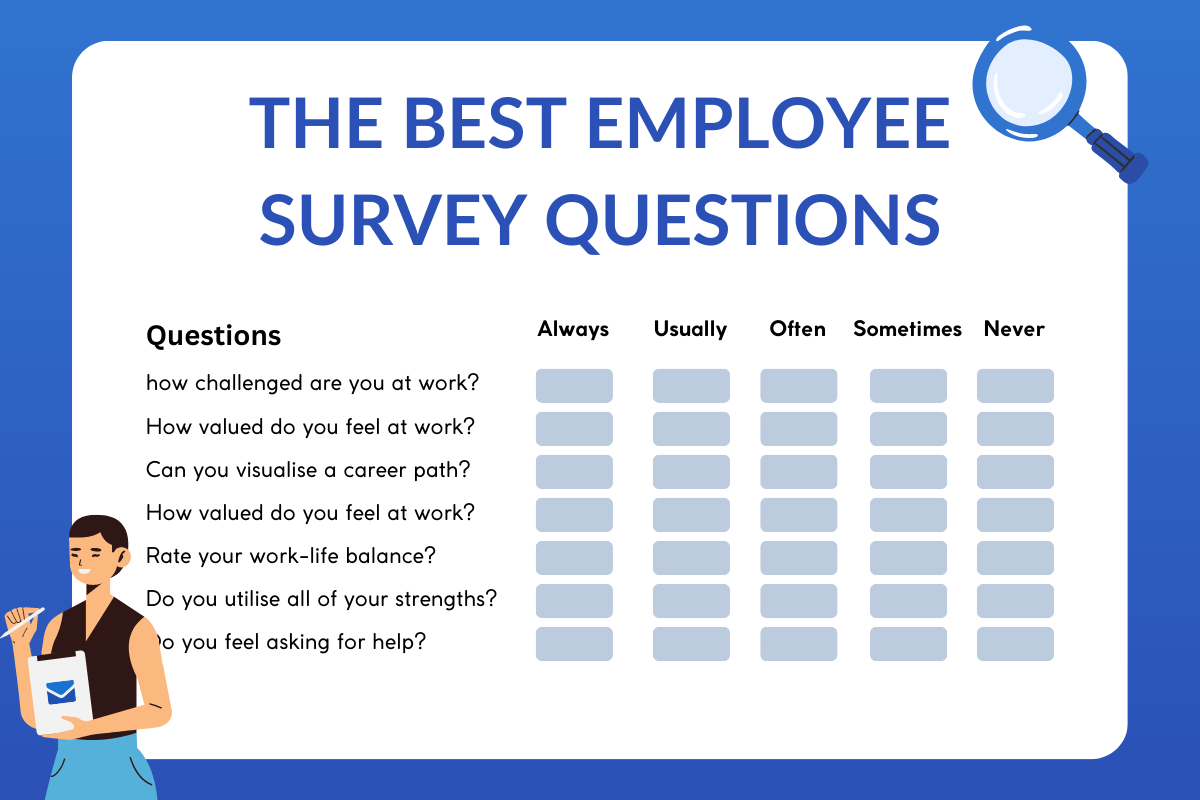The best employee survey questions
The 15 dos and don’ts of employee surveys
Employee surveys are a hugely valuable method of gathering information from employees but there are many things to consider for you to maximise what you achieve.
1 – Do have a clear goal for your survey
Ensure you know exactly what you want the survey to achieve. Do you want to measure employee engagement? Are you seeking to measure employee engagement, gather opinions on new company values, or better understand learning and development requirements? Whatever your reason keep it in mind throughout your survey creation ensuring every question relates to the outcome you want to achieve. This will keep it focused and provide higher quality results.
2 – Do Not send a survey without the relevant leadership team agreeing to its value, goals and output
The leaders of whichever teams you are sending the employee survey to need to understand its purpose, benefit and outcome to ensure they promote it effectively to their teams. Any doubt or uncertainty will reduce the number of people that take part and potentially influence how they answer the questions.
3 – Do have a clear understanding of what the employee survey results will contribute to
Will the output from the survey be the decisive factor for a business decision? Will it contribute to other opinions and/or research? While having a goal is a starting point you also need to be clear as to how the survey will contribute to that goal. This also needs to be known and agreed upon by the entire leadership team. Any confusion or disagreement will hamper the effectiveness of the results.
4 – Do Not send a survey without your employees knowing exactly what it is for
To maximise survey participation you need to explain why your employees should take time to fill in the survey. This is your time to “sell” the survey. Include your goal, how the results will be used and expected timescales for the results to be actioned.
5 – Do stick to one purpose
So often employee surveys end up covering multiple goals. As a result, they either become very long or don’t ask sufficient questions to get a conclusive result. By having a single goal for every survey you and your employees will have a much clearer picture of what its purpose is.
6 – Do Not exclude employees from taking part in the survey
While you may not intentionally exclude people from answering the survey if they do not have direct access to the survey their opportunity will be limited. Either find an employee survey tool that can be sent and filled in via a mobile device or hold sessions in which those employees can have access to the survey. Without this inclusive approach, your results will never be accurate.
7 – Do be consistent
If your employee survey will be repeated set specific times for the survey. We are naturally creatures of habit so this familiarity will help with completion rates. If relevant, also include how the results of the previous survey have influenced or changed the business. The reiteration of how the results were used will further build confidence that their time spent filling in the survey will be time worth spent.
8 – Do Not overcomplicate your survey
Keep your questions to the point. Unnecessary or confusing words in a question will increase the effort required to complete the survey. Avoid using any jargon and keep your wording as simple as possible. Make sure there are no double negatives and ensure every question only asks for one thing.
9 – Do mix your questions up
Ensure your questions are varied enough to keep your employees interested. While you may want to ask five questions to really drill into what they think about one thing, your employees are likely to lose interest. Also, use a variety of answer choices such as multiple choice, radio buttons and sliding scales. This encourages the recipient to keep focused.
10 – Do Not include too many open-ended questions
While these are useful to give employees an opportunity to expand on a specific point, they also require more effort to answer. As such, many people are likely to skip the question or abandon the survey. They also make it more difficult when analysing the results of the survey. Due to the manual element of needing to review each answer, open-ended answers can become overlooked.
11 – Do keep your employee survey questions neutral
Perhaps one of the hardest things to achieve because you are naturally thinking about how the responses will be used. But effective surveys ensure that every question is neutral. Leading questions that demonstrate opinion will influence the results. Employees will answer the question how they think it should be answered rather than giving their true opinion. For example, instead of asking “How would you rate the success of our leadership team?” ask “How would you rate the performance of our leadership team?”
12 – Do Not miss out answers in your multiple-choice questions
If using multiple choice take a step back from the question and ensure you include all potential answers. Think of it on a scale from worst to best and include a mid-way response that enables the employee to be neutral. If it isn’t clear cut include a ‘none of the above’ or ‘other’ option. As a survey participant, there is nothing more frustrating than not having the option to select the answer you have in mind.
13 – Do ensure you and/or colleagues have the time to analyse the results
Recent research discovered that just 28% of survey senders are happy with how they use the results. This is usually because of limited time or resources to analyze the findings. Also, leaders may not value the survey’s insights. So, make sure you dedicate enough time to analyze every insight before starting the survey.
14 – Do Not forget to communicate the results of the survey and the actions that will follow
The moment employees think survey results aren’t used or listened to is the moment your employee survey participation rate plummets. Once you have analysed the results ensure your share these with your employees and include the outcome of the results. What will happen next, and what are the timescales for the changes?
15 – Do consider the user experience
A survey that is clunky to complete or visually unappealing will increase abandon rates. You need to make it as easy and as pleasant an experience as possible. The right employee survey tool should do a lot of this for you but always take a moment to fill the survey in as an employee to ensure it engages you and flows naturally.
Find further tips on how to improve employee survey response rates here.
The best employee survey questions
Employee surveys can cover a vast array of topics from learning and development to cultural alignment. To help you get the most out of your employee survey we have selected questions for the five most common types of employee surveys; professional development surveys, employee satisfaction surveys, employee wellbeing surveys, employee engagement surveys and company culture surveys. All of the questions listed have been chosen because of the quality of the output they generate.
For each closed-ended question consider your pre-defined answer set. Some may benefit from multiple choice answers while others may be better suited to a scale. This consideration combined with the dos and don’ts listed above will help ensure you gather highly valuable insight from your employees.
Questions for professional development employee surveys
Whether you want to understand what your employees need and expect to progress their careers with you, or you want to assess how effective your learning and development programmes are, these questions will help you get the answers.
- Do you feel you have the knowledge and support necessary to successfully do your job?
- Are your tasks and responsibilities clearly defined and achievable?
- Does our organisation support you in your career progression?
- On a daily basis, how challenged are you at work?
- Can you visualise a career path at [organisation]?
- How invested is your line manager in your success?
- Do you see yourself working here in two years?
- How well does your manager support your career development?
- Do you utilise all of your strengths in your role?
- What would you change about our learning and development programme?
Questions for employee satisfaction surveys
These are the questions to ask if you want to gauge overall employee satisfaction. They will collate the views, attitudes and perceptions of your employees. An employee satisfaction survey is often used if you suspect an element of dissatisfaction because the results can help to define what that dissatisfaction is.
- How satisfied are you with your job requirements and targets?
- Does your line manager value your opinion?
- If you could, what’s the one thing that you would change about your job?
- When was the last time your manager recognised your achievements at work?
- How satisfied are you with your current compensation and benefits?
- Do you feel your role impacts the future success of our company?
- Do deadlines and workloads regularly cause you stress?
- How effective do you think our leadership team is?
- Are you confident in our organisation’s financial stability?
- Hypothetically, if you were to quit tomorrow, what would your reason be?
- If you were given the chance, would you reapply for your current job?
- Do you look forward to starting work each morning?
Questions for employee wellbeing surveys
The following questions will help you understand the level of wellbeing within your organisation whilst also identifying if there are any opportunities to improve your wellbeing initiatives.
- How would you rate your work-life balance?
- How valued do you feel at work?
- Do you have all the tools and equipment you need to fulfil your role adequately?
- How comfortable do you feel providing feedback to your manager?
- Does your physical workspace fulfil your needs?
- How connected do you feel with your colleagues?
- When something unexpected comes up in your work, do you usually know who to ask for help?
- Do you believe you’ll be able to reach your full potential here?
- Do you feel comfortable and relaxed at work?
- How could your work environment be improved?
Questions for employee engagement surveys
These questions will help you understand employee engagement by delving into the levels of commitment and drive each employee has for the work they do at your organisation.
- How transparent is our company when communicating company performance?
- Are you proud to work for [organisation name]?
- How inspired are you by the company vision and values?
- How likely are you to recommend [organisation name] as a good place to work?
- Do you understand the strategic goals of the organisation?
- Do you feel like you are contributing to the strategic goals of the organisation?
- Do you look forward to coming to work each morning?
- How empowered do you feel at work?
- How can we improve your engagement at work?
- Do you believe we will reach our organisational objectives?
- Are we a better organisation now than we were six months ago?
- Within your role, do you believe you have a positive impact on the organisation?
Questions for company culture surveys
Is the way that your employees view their work environment aligned with your company culture vision? These questions will find out by helping you measure the effectiveness of your corporate values.
- How comfortable do you feel contributing ideas and opinions at work?
- Without looking them up, can you recite our company values?
- How comfortable do you feel asking for help?
- What three words would you use to describe our culture?
- Do you believe we are achieving our company values?
- Does [organisation name] adequately addresses discrimination and inequality?
- Do you think [organisation name] is socially responsible?
- To what extent do colleagues respect one another?
- How well does the leadership team listen to your feedback?
- What can we do to improve the company culture?
- Do you think the results of this survey will positively impact the future of our organisation?
- In your opinion, how does this organisation define success?
Do you have the right employee survey tool to conduct your employee surveys?
Our employee survey tool enables you to create bespoke employee surveys whenever you need them. Results are presented in real-time dashboards making it quick and easy for you to analyse the results. Thanks to NewZapp surveys, everyone in your organisation receives the survey no matter where or when they work. This, combined with the ability to communicate the results with everyone through the internal communications tool, makes NewZapp a very effective employee survey tool. Discover more here.
Relevant resources

Supporting employees with stress in the workplace
As an internal communicator you have a lot of strings to your bow. One of those includes supporting employees with stress in the

How to Promote Employee Empowerment
We’ve all heard the phrase when asking a question that is ever so slightly outside the script. “Let me talk to my manager

The damage caused by employee sleep disorders
Sleep disorders are a global epidemic. A whopping 45% of the world’s population suffer from sleep problems. That’s 45% of your employees that may have a reduced attention span, poor memory, lack of energy and mood swings. All of these




